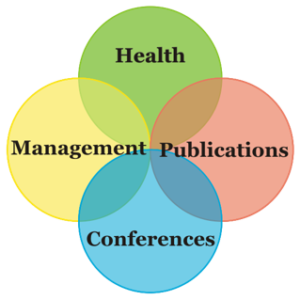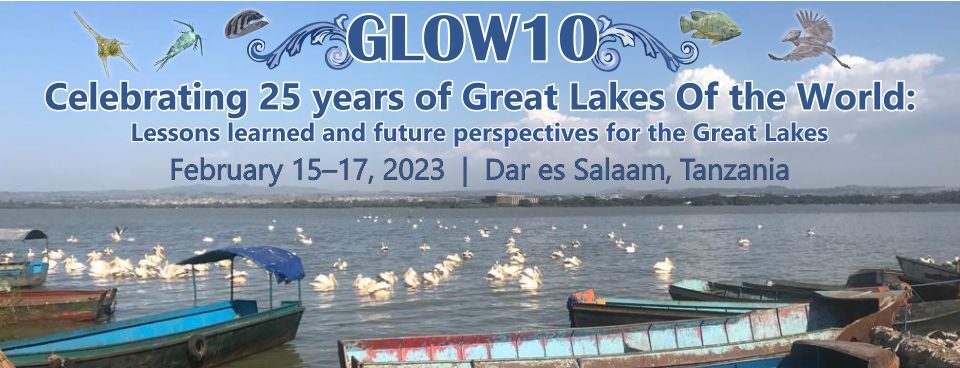The Aquatic Ecosystem Health and Management Society

Since its establishment in 1989 as a not-for-profit scientific society, the Aquatic Ecosystem Health and Management Society (AEHMS) has actively encouraged ecosystem-based science and management by promoting integrated and holistic initiatives for conserving global aquatic resources. It focused on the promotion of ecosystem-based science, approaches, health, management, and restoration of marine and freshwaters of the world. In order to promote its objectives the Society organizes conferences, symposia and workshops around the globe (see attached diagram). The knowledge shared at these events is preserved in the Society’s two publications: issues of the ISI rated primary journal, Aquatic Ecosystem Health and Management (AEHM) published jointly with Michigan State University and books of the Ecovision World Monograph Series published by the AEHMS. The AEHMS had the privilege of establishing the GLOW working group in 1996 in Zimbabwe, and it is pleasing that we are celebrating now its silver jubilee via GLOW10 conference. To date the Society has organized nine Great Lakes of the World events, followed by publication of 11 special issues focusing on Great Lakes of the World. An account of the GLOW conferences and publications is outlined below:
| No. of GLOW | Name of conference and location | Publication |
| GLOW 1 | Exploring Great Lakes of the World (GLOW): Food-web Dynamics, Health and Integrity. Victoria Falls, Zimbabwe | AEHM 03(1). Jan 2000 |
| GLOW 2 | Sustainability of Great Lake: Is it a scientifically Sound and Practical Concept. Shannon, Ireland | AEHM 05(3). 01.03.2002 |
| GLOW 3 | The Great Lakes of the World Symposium: Arusha, Tanzania | AEHM 10(4). 28.11.2007 |
| GLOW 4 | State of Lake Tanganyika, a Case Study: Climate change, Food web alterations, Invasive species, and Management. Bagamoyo, Tanzania | AEHM 11(1). 11.03.2008 |
| GLOW 5 Part I | Great Lakes of the World and Rift Valley Lakes. Addis Ababa, Ethiopia | AEHM 13(1). 26.02.2010 |
| GLOW 5 Part II | Great Lakes of the World and Rift Valley Lakes. Addis Ababa, Ethiopia | AEHM 13(2). 28.05.2010 |
| GLOW 6 | Linking Ecosystem-Based Science to Management in the Great Lakes of the World. Incline Village, NV, USA | AEHM 16(3). 01.07.2013 |
| GLOW 7 | Protecting Great Lakes of the World: Managing Exploitation with Ecosystem-based Science. Bujumbura, Republic of Burundi | AEHM 17(1). 02.01.2014 |
| GLOW 8 | Advancing the Ecosystem Approach: Good Governance for Adaptation and Rehabilitation. Mangochi, Malawi | AEHM 21(2). 03.04.2018 |
| GLOW 9 Part I | Emerging frontiers for African Great Lakes: Promoting blue economy, food security, and conservation. Kisumu, Kenya | AEHM 24(1). 02.01.2021 |
| GLOW 9 Part II | Emerging frontiers for African Great Lakes: Promoting blue economy, food security, and conservation. Kisumu, Kenya | AEHM 25(4). 12.15.2022 |
Lake Victoria Fisheries Organization
The Lake Victoria Fisheries Organization (LVFO) was established by a Convention in 1994, and became a specialized institution of the East African Community (EAC) after the latter’s re-establishment in 1999. The LVFO Secretariat is based in Jinja (Uganda), and signatories to the Convention comprise four Partner states: The Republics of Kenya, Uganda, Burundi and the United Republic of Tanzania. On the other hand, the EAC with its headquarters in Arusha (Tanzania), is guided by a Treaty (1999). In addition to the LVFO Member States, the Republics of Rwanda and South Sudan, and the Democratic Republic of Congo (DRC) are also signatories to the EAC Treaty.
The mandate of LVFO is to promote and coordinate the sustainable management and development of fisheries and aquaculture resources in the EAC region for the purpose of ensuring sustainability in food security and wealth creation. As one of its functions, the LVFO is charged with strengthening the EAC framework and capacity for fisheries and aquaculture research and resources monitoring, and dissemination and sharing of fisheries and aquaculture research results.
It is in this regard that LVFO has teamed up with TAFIRI, AEHMS and ACARE to co-organize this important conference in Dar es Salaam, Tanzania. It is our belief that researchers, students, managers, policy makers, the civil society and the private sector from the seven EAC Partner States and beyond, will utilize this auspicious occasion to attend and present their findings of research, actively participate in policy dialogues, showcase their work through exhibitions, discuss issues of strategic importance in fisheries and aquaculture, and most importantly, reflect on lessons learned and future perspectives for the Great Lakes.
African Center for Aquatic Research and Education
Recognizing that no one organization or institution can address the challenges that our global freshwater resources face, the African Center for Aquatic Research and Education (ACARE) partners with local, regional, and global experts to leverage the combined skills, assets, technologies and resources to strengthen freshwater science and networks in the African Great Lakes region.
To do this well, ACARE is creating a long-term collaborative process by which the scientific, academic, policy and management, and other interested communities interact to prioritize research and thus, harness the resources and knowledge to positively influence policy and management of these resources. The entire focus of ACARE is to ensure that the ecological structures of the African Great Lakes are preserved and enhanced for the benefit of the millions of people who depend on them.
ACARE serves as a support mechanism for local and regional partners, collaborating, coordinating, and harmonizing efforts and information to ensure the health of some of the largest, and most important freshwater resources in the world.
Tanzania Fisheries Research Institute
The Tanzania Fisheries Research Institute (TAFIRI) is an Institution under the Ministry of Livestock and Fisheries that was established by the Act of Parliament No. 6 of 1980 with the aim of promoting, conducting, and coordinating fisheries and aquaculture research in Tanzania. The Act was repealed by the Act of Parliament No. 11 of 2016.
TAFIRI headquartered at the Coelacanth House, located on Ugweno Street in Kunduchi, Dar es Salaam, Tanzania. The Institute has four Research Centres and one sub-station, which are located on all major water bodies — the three Great Lakes and the Indian Ocean. The Centres are in Kigoma, Kyela, Mwanza and Sota for Lakes Tanganyika, Nyasa and Victoria respectively, and at Kunduchi in Dar es Salaam for the Indian Ocean. TAFIRI’s scope of research extends to all water bodies — natural and man-made —including satellite lakes, dams, wetlands, streams, rivers and brackish water. TAFIRI has a Vision of becoming “a strong centre of excellence in fisheries research and consultancy in the eastern and southern Africa”, and a Mission “to promote, conduct and manage fisheries research and consultancy for sustainable development of fisheries in Tanzania”.
TAFIRI’s mandate includes the obligation to ensure that all fisheries and aquaculture and alied research conducted in the country is properly and timely communicated/disseminated to the scientific and policymakers’ communities through research meetings, conferences, science-to-policy dialogues and various publication outlets. To fulfill this mandate, TAFIRI is, in collaboration with the Aquatic Ecosystem Health and Management Society (AEHMS), the African Center for Aquatic Research and Education (ACARE), and the Lake Victoria Fisheries Organization (LVFO), organizing the 10th Great Lakes of the World (GLOW 10) conference which will focus on the health of the Great Lakes of the world. The conference, which will take place from 15th to 17th February 2023 at the Julius Nyerere International Convention Centre (JNICC) in Dar es Salaam, Tanzania, is expected to bring together over 300 scientists, scholars and decision-makers to expound on the status and future of the world’s Great Lakes. We believe the conference will offer a platform for communicating fundamental, innovative and applied research approaches, thus informing policy to guide sustainable resources use, conservation and management in the Great Lakes of Africa and the world.
On behalf of the Organizing and Program Committees at AEHMS, ACARE and LVFO, we are pleased to welcome you to Tanzania, Dar es Salaam in particular, to enjoy both the healthy scientific and policy discourses and the beautiful and unforgettable nature experiences — ranging from ancient lakes, nature reserves and parks, to white sand beaches and rich underwater worlds. As co-chairs of this conference, we are delighted and honored to extend a warm welcome to you all.
“Karibuni Tanzania”

